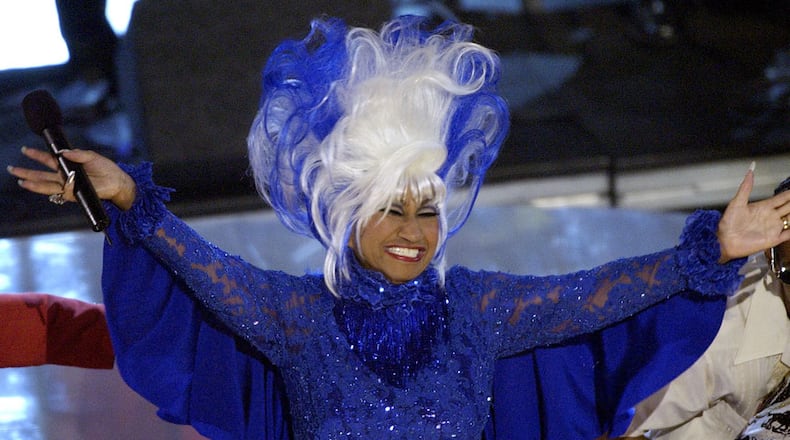For most, Celia Cruz is a timeless icon with one of music history’s most inimitable voices. For South Fulton’s Linda Becquer-Pritchett, she is just tía.
Long before she became a councilwoman in South Fulton, the metro area town with the highest proportion of Black residents, Becquer-Pritchett grew up in a three-story house in Queens, New York with her Cuban family. The top floor was occupied by Cruz, the Havana-born singer who would go on to reach the most improbable heights of artistic success while in exile, making a name for herself around the world as the ‘Queen of Salsa.’
“She’s been my whole life,” Becquer-Pritchett, the daughter of Cruz’s younger sister Gladys, said.
As Cruz’s number of records sold approached and then crossed the 10 million mark, the accolades multiplied. There were the Grammy Awards, including a lifetime achievement award. There was the Smithsonian exhibit, the star on the Hollywood Walk of Fame, the bestowment of the National Medal of Arts by President Bill Clinton. Later this year, a joyous depiction of Cruz will grace a special edition of the U.S. quarter.
When Becquer-Pritchett thinks of her aunt, the most vivid memory is how she made people feel – especially other members of the Afro-Latino community, which has long grappled with a lack of representation and visibility.
“For our community, the Afro-Latino community, she gave them a sense of pride,” Becquer-Pritchett said. “She was kind of like the ambassador for all Latino people of color … There was no replacement for Celia.”
Credit: Jenni Girtman
Credit: Jenni Girtman
Becquer-Pritchett credits the strength of Cruz’s connection with her audience to her unwavering embrace of her roots – including the African rhythms that permeated her music since her earliest days as a performer in Havana, where she made history as the first Black lead female singer of one of Cuba’s most popular orchestras, La Sonora Matancera. Although she wound up living most of her life in the U.S. and, according to Becquer-Pritchett, spoke much better English than she let on, her work was always Spanish-only.
“She stood with her market, which was providing music for her people,” Becquer-Pritchett said.
Still, the force and charisma of Cruz’s talent transcended the Hispanic or Spanish-speaking community. Non-Latin Black artists who have said they were influenced by Cruz include the poet Maya Angelou. Legendary singer Patti LaBelle collaborated with Cruz and also sang at her funeral, in 2003.
Although Cruz’s deliciously catchy cry of “azúcar” (’sugar’), was born out of an interaction with a Miami waiter, many have found significance in its connection to the history of Black people in Cuba, who were brought as slaves to the island to work its sugar fields.
References to Cruz’s Black pride can be found throughout her oeuvre. One of her last hit songs, released in 2001 just weeks before her 76th birthday, was called “La Negra Tiene Tumbao,” which roughly translates to “The Black Lady’s Got Style.”
Cruz as the blueprint
Latin music is in a boom of mainstream popularity, both around the world and in the U.S.
Puerto Rican star Bad Bunny has become a fixture among the top of streaming charts with music that makes no concessions to English-language pop audiences. In 2023, artists like Shakira, Karol G, Peso Pluma and Grupo Frontera all joined Bad Bunny in scoring top 10 hits in Spanish on the U.S.’ Billboard Hot 100.
It’s difficult to think Latin music could grow as commercially imposing as it has in the U.S. without the trail blazed by Cruz and others in decades past, who brought rhythms’ like salsa’s from the fringes to the fore.
Latin music’s current mass appeal is also generally indebted to the African diaspora, given the influence of rap and reggaeton, a music genre of Afro-Panamanian roots, in much of today’s hit Spanish-language music.
Reflecting those broader cultural changes around the country, Latin music has gradually carved out a spot for itself in Atlanta nightlife. In late 2016, a group of friends created a monthly dance party, La Choloteca, that would go on to become a popular and vibrant gathering spot for the metro area’s Hispanic.
Credit: Ben Gray
Credit: Ben Gray
A desire to showcase the range and diversity of Latin music was also a goal behind Oye Fest. Since launching in 2018, the yearly festival has strived to give a platform to artists that hail from Atlanta’s local Hispanic community.
“Our role is to keep providing these opportunities for people to embrace their heritage,” said Randall Ruiz, the festival’s co-founder, who noted that Cruz served as the “blueprint” for many of the Latin artists popular today.
Josephine Figueroa, a co-founder of La Choloteca, said an important component of Cruz’s legacy is that she made Latin music audiences fall in love with a proudly Afro-Cuban woman “at a time when racial biases were still very real in Latin America.”
For Hispanic immigrants in the U.S., she also brought joy and a sense of hope “that sweetened the bitter journey of migration,” Figueroa said.
“I truly believe that her final albums were odes to the many migrant families coming to the U.S. and building new lives and new futures,” she added.
Credit: Jenni Girtman
Credit: Jenni Girtman
ABOUT THIS SERIES
The AJC’s Black History Month series focuses on the role of African Americans and the Arts and the overwhelming influence it has had on American culture. These daily offerings appear throughout the paper. More subscriber exclusives on the African American people, places and organizations that have changed the world are available at ajc.com/news/atlanta-black-history
About the Author
Keep Reading
The Latest
Featured





